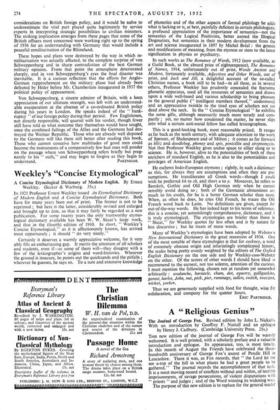Weekley's "Concise Etymological"
IN 1921 Professor Ernest Weekley issued An Etymological Dictionary of Modern English and A Concise Etymological Dictionary. Both have for many years been out of print. The former is not to be reprinted ; but here is the latter, considerably revised and enlarged and brought up to date, so that it may fairly be regarded as a new publication. For some twenty years the only trustworthy etymo- logical dictionary available has been W. W. Skeat's large work, and that in the (fourth) edition of 1910. In short, " Weekley's Concise Etymological," as it is affectionately known, has arrived most opportunely ; it should " do very nicely."
Certainly it deserves a warmly appreciative welcome, for it very ably fills an embarrassing gap. It merits the attention of all scholars and students, even if—as some of them will—they disagree with a few of the lexicographer's origins and word-histories. Wherever the ground is insecure, he points out the quicksands and the pitfalls ; wherever he guesses, he says so. To a sure and extensive knowledge of phonetics and of the other aspects of formal philology he adds what is lacking or is, at best, painfully deficient in certain philologists: a profound appreciation of the importance of semantics—not the semantics of the Logical Positivists, better named the Illogical Dogmatists, but semantics in their modern development from the art and science inaugurated in 1897 by Michel Breal : the genesis and modifications of meaning, from the etymon or stem to the latest signification in physics or psychiatry.
In such works as The Romance of Words, 1912 (now available, as a Guild Book, at the absurd price of eighteenpence), The Romance of Names, 1914, unfortunately out of print, Words Ancient and Modern, fortunately available, Adjectives and Other Words, out of print, and Jack and Jill, a delightful account of the so-called Christian names, a book still to be had—in all these, as in several others, Professor Weekley has prudently concealed the fearsome phonetic apparatus, used all the resources of semantics and drawn upon a wide well-based and various scholarship to bring pleasure to the general public (" intelligent members thereof," understood) and an appreciative twinkle to the tired eyes of scholars not yet dead above the neck. In the " Concise Etymological " he exhibits the same gifts, although necessarily much more tersely and com- pactly ; yet, no matter how condensed the matter, he never slips into what a certain anti-social fellow has called lexicographese.
This is a good-looking book, most reasonably priced. It ranges as far back as the tenth century, with adequate attention to the work of Spenser, of Shakespeare and of Milton ; it comes as far forward as blitz and doodlebug, phoney and spiv, penicillin and streptomycin. Not that Professor Weekley gives undue space to sillier slang or to science. He is, however, alive to the potentialities of both of these enrichers of standard English, as he is also to the potentialities and privileges of American English.
He eschews Indo-European etymons ; rightly, in such a dictionary as this, for always they are assumptions and often they are pre- sumptions. He transliterates all Greek words—though I could wish he preferred kh to ch, and short u to y. Moreover, he refers to Sanskrit, Gothic and Old High German only when he cannot sensibly avoid doing so ; both of the Germanic abstentions are much to his credit, for he is a better German scholar than most. When, as often he does, he cites Old French, he traces the Old French word back to Latin. No definitions are given, except for out-of-the-way words. He has indeed kept to his terms of reference; this is a concise, yet astonishingly comprehensive, dictionary, and .t is truly etymological. The etymologies are briefer than those in " Skeat," for Weekley quotes far less often and is by nature fix less discursive ; but he treats of more words.
Many of Weekley's etymologies have been adopted by Webster's New International Dictionary in the great recension of 1934. Ore of the most notable of there etymologies is that for cockney, a word of extremely obscure origin and infuriatingly complicated history, the scales being pretty evenly weighted by the editors of The Oxford English Dictionary on the one side and by Weekley-cum-Webster on the other. Of the scores of other words I should have liked :0 recommend to the earnest, not too solemn, attention of the, curious, I must mention the following, chosen not at random yet somewhat arbitrarily : avalanche, barnacle, chum, dot, equerry, galligaskins, gamut, harlot, John, nut, pick, pier, rummage, sullen, switch, tweezers, wicket, yorker.
Thus we are generously supplied with food for thought, wine for exhilaration, and company for the quieter hours.
ERIC PARTRIDGE.


































 Previous page
Previous page